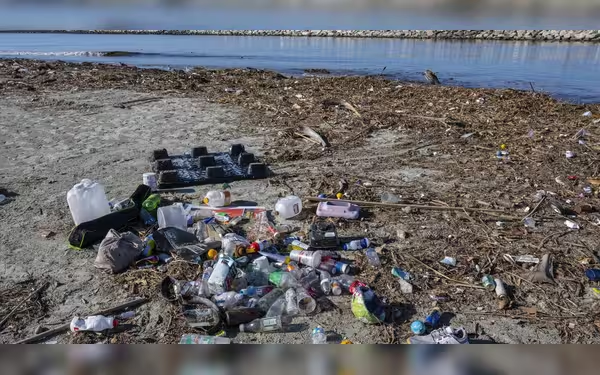Saturday, November 16, 2024 07:32 PM
California Sues ExxonMobil Over Plastic Recycling Deception
- ExxonMobil accused of misleading public on plastic recycling.
- California seeks accountability for plastic pollution crisis.
- Lawsuit highlights corporate responsibility in environmental issues.
 Image Credits: gnnhd
Image Credits: gnnhdCalifornia's lawsuit against ExxonMobil claims deception over plastic recycling effectiveness, highlighting corporate accountability in environmental issues.
In recent years, the issue of plastic waste has become a pressing concern for many around the globe. With the rise of single-use plastics, the environment has been inundated with waste that is difficult to recycle. A new lawsuit filed by the state of California against ExxonMobil has brought this issue to the forefront, claiming that the company has misled the public about the effectiveness of plastic recycling for nearly fifty years. This lawsuit highlights the ongoing struggle between environmental responsibility and corporate practices.
According to California's attorney general, ExxonMobil is the world’s leading producer of single-use plastics, which often end up as waste. The lawsuit alleges that the company has perpetuated a "myth" that recycling could solve the growing plastic waste crisis. In reality, plastic is notoriously difficult to recycle, and only a small fraction of it is ever reused. Experts warn that promoting recycling as a solution can actually lead to more plastic waste, as it gives consumers a false sense of security about their environmental impact.
California's attorney general, Rob Bonta, stated, "For decades, ExxonMobil has been deceiving the public to convince us that plastic recycling could solve the plastic waste and pollution crisis when they clearly knew this wasn’t possible." This statement underscores the gravity of the situation, as the state seeks to hold the petrochemical industry accountable for the pollution that has accumulated in the environment, affecting wildlife and even human health.
The lawsuit claims that ExxonMobil has violated several laws, including those related to public nuisance and false advertising. California is not only seeking civil penalties but also aims to establish an abatement fund to address the ongoing plastic pollution crisis. The attorney general's office has pointed to a 12-page advertisement from 1989 in Time magazine, which emphasized the need for recycling, as an example of the company's misleading marketing tactics.
Despite the claims made by ExxonMobil about the recyclability of plastics, the reality is stark. By 2015, less than 10 percent of plastic waste had ever been recycled, with nearly 80 percent of the 6,300 million metric tons of plastic waste created globally ending up in landfills or littering the environment. Even when plastic is recycled, it is often "downcycled," meaning it is transformed into lower-quality materials rather than new plastic products.
ExxonMobil has responded to the lawsuit by shifting the blame to California, arguing that the state has known about the inefficacy of its recycling system for decades. The company claims that instead of suing, California officials should have collaborated with them to find solutions to the plastic waste problem.
As the world grapples with the consequences of plastic pollution, it is essential to recognize the role that corporations play in this crisis. Plastics, made from fossil fuels, contribute significantly to global greenhouse gas emissions, even more than emissions from global shipping. The lawsuit against ExxonMobil serves as a reminder that accountability is crucial in addressing environmental issues.
The ongoing legal battle between California and ExxonMobil sheds light on the broader issue of plastic waste and recycling. It emphasizes the need for transparency and honesty in corporate practices, especially when it comes to environmental claims. As consumers, it is vital to stay informed and advocate for sustainable practices that genuinely address the plastic pollution crisis, rather than relying on misleading narratives that may only serve corporate interests.













